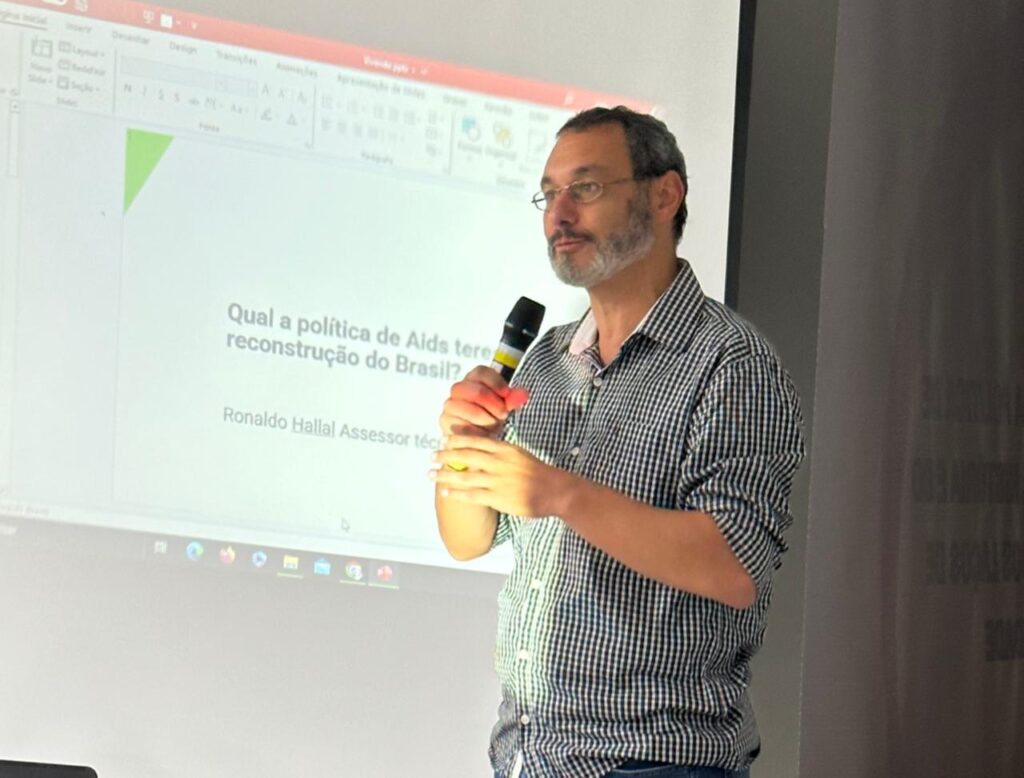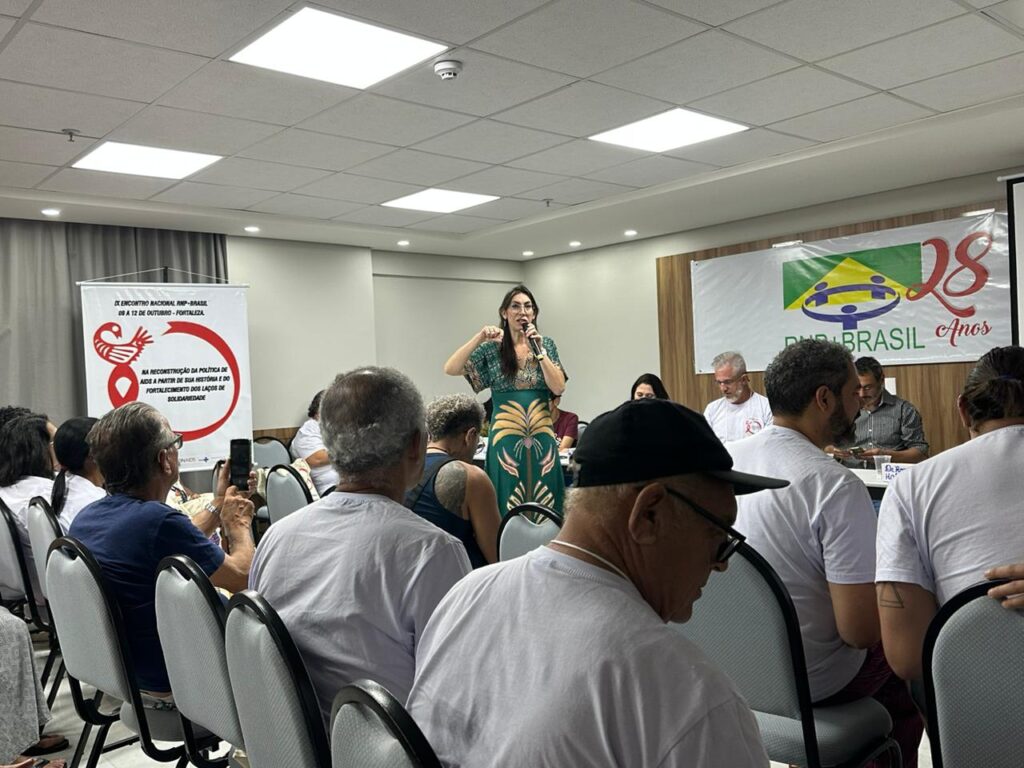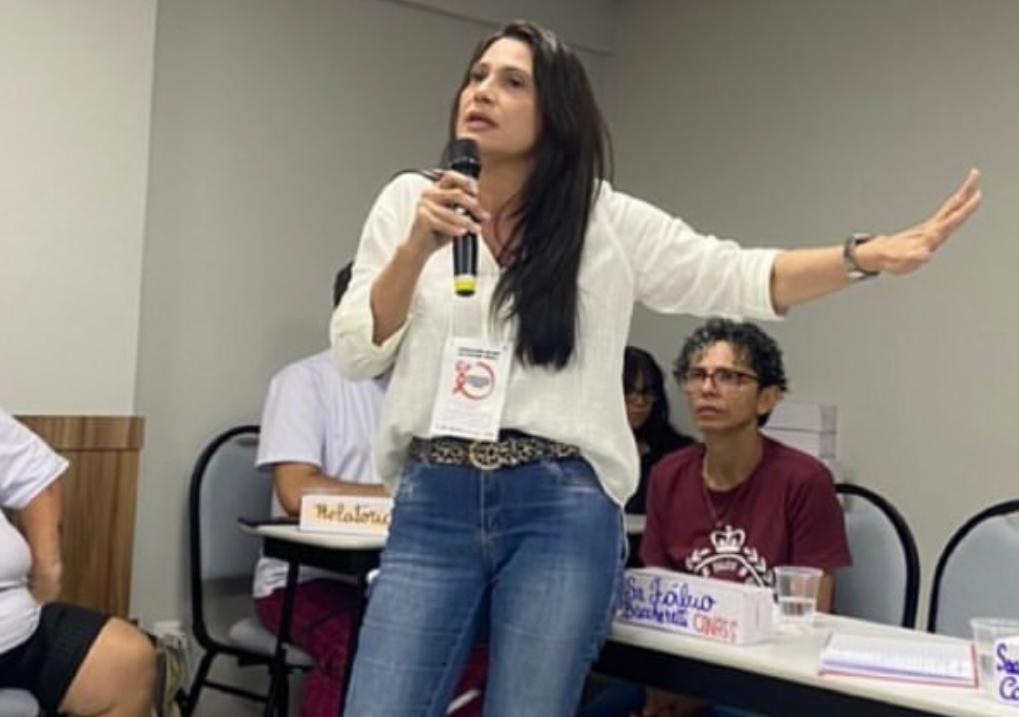What anti-AIDS policy will we follow in the reconstruction of Brazil? With this question, the National Network of People Living with HIV/AIDS (RNP+Brasil) opened the second day of discussions at its ninth national meeting, held in Fortaleza, Ceará.
Nearly 100 participants listened intently to the government, which was represented at this table by infectious disease specialist Ronaldo Hilal, technical advisor in the Department of HIV/AIDS, Tuberculosis, Viral Hepatitis and Sexually Transmitted Infections (DATHI); Ariadne Ribeiro, Equality and Rights Officer at Unaids Brazil; and activists Moises Toniolo, from the National Council of Health, and Vanessa Campos, RNP+Brasil representative in Unaids GT.
Dr. Ronaldo stressed that highlighting AIDS is part of the reconstruction of Brazil, and an example of this, according to him, is returning the word AIDS to the official name of the administration. “One of the priorities in the care and treatment of people living with HIV/AIDS is to reduce mortality and late diagnosis. To achieve this, we must promote human rights and combat stigma and social inequality. We must expand diagnosis and timely initiation of antiretroviral therapy.” He added that qualifying strategic information and developing a policy based on scientific evidence leads to improving the quality of life for people infected with HIV.
“We don’t just want an undetectable viral load, we want quality of life. It is not possible to organize an AIDS response without planning. Civil society is part of Dathi’s strategic planning. Right now, what we are trying to do is restore the gap that has existed in recent years. I believe in the UN goals to end AIDS as a public health problem, but it is necessary to add a goal that addresses the quality of life of this population.
The director also spoke about the quality of treatment, recalling that the current government recently updated the clinical protocol and treatment guidelines. “We have more than a million people infected with HIV in Brazil, 90% of whom have already been diagnosed, 82% of whom are on antiretroviral therapy, and of whom 95% on medication have the virus suppressed. In other words, there is an AIDS epidemic, and we need To the response to deal with it. There are many people lost to follow-up, we have almost 500 people who need alternative treatment, not to mention the comorbidities and toxicity. We already have new medicines in the world, but we need to think about the policy of obtaining them in a sustainable way and at a fair price. “We have had some discussions with the participation of civil society.”
What policy does the AIDS movement want?
Just like Dr. Ronaldo and Ariadna Ribeiro agreed that it was necessary to fight abusive prices from the pharmaceutical industry. Regarding the issue of the table, she criticized the obstacles to the narrative and said, “Our responsibility is not to think like a herd.” It is civil society that decides what policy we want to combat AIDS, and I hope it is sensitive to all the weaknesses. We have to understand AIDS policy as a policy that will influence current economic and social policies.
Ariadne continues: “In Brazil, the increasing trend in AIDS deaths is greater in the northern and northeastern regions. We can’t leave anyone behind. 3 in 10 trans women in Brazil live with HIV, and 18% of men who have sex with men also live with HIV, not to mention sex workers and injection drug users, at more than 5%. Young black men and women account for the majority of new HIV infections in Brazil, as well as nearly 60% of deaths from AIDS. Indigenous people have the highest dropout rate from antiretroviral therapy and are delayed in accessing health services. Are we all paying attention? “Gender-based violence exists.”
Resistance and reinforcement
It was up to civil society representatives to answer what policy they expected on AIDS, based on Brazil’s reconstruction. “We hope that this government will really rebuild things, we have been persecuted a lot in recent years. We are not expenses, we need policy to encourage civil society work that ultimately works. The money for AIDS is there, and the states and municipalities that receive the money need to tell us Where to invest, and part of this resource is dedicated to supporting civil society work. Moises stressed: “We are not asking for favors, and we have the right to ask for money.”
The activist called on activists to continue political influence at the popular level. “We always have to demand and implement social control and know the decrees. In the annual management report, for example, municipalities say what they will invest in. We must have access to all these documents.”
In activist Vanessa Campos’ assessment, “a human rights-based quality of life must be the prerogative of our treatment and AIDS policy in Brazil, and we must take it out of discourse and put strategies into action so that this can actually become a tangible reality.”
Vanessa drew the group’s attention to the number of people living with HIV who have multiple resistance to treatment. “Are we going to leave these people behind? Without a genotyping protocol, we don’t even know how many there are. I’ve been living with HIV for 33 years, and at some point the drug might fail for me, too. I believe that breaking patents is the way to get to more drugs.” effectiveness.
Regarding the loss of follow-up, the activist wanted to know why health services abandoned patients. For her, there is no quality of life for people living with HIV without access to vaccines. “Until now, it has not been clear why the HPV vaccine is only available to people with HIV up to 45 years of age. I wanted to take it but couldn’t access it. Now I have access, but I’m not old enough. And we also want Get a vaccine that protects against shingles.
Vanessa ended her speech by drawing attention to the importance of communication in the fight against AIDS and in the interests of life. “If we want an AIDS policy based on human rights, we need mass campaigns that say undetected means no HIV transmission.”
For more than three hours, activists focused on the topic of the table, with proposals that will be included in the final document of the meeting. There were people who talked about creating an HIV protocol with a focus on mental health, others drew attention to the particularities of aging living with HIV, and some said that AIDS policy should be comprehensive. Fando de Oliveira, representative of the RNP+Brasil party, criticized the absence of representatives of the Parliamentary Anti-AIDS Front in the National Congress and the National Council of State Health Secretaries.
Talita Martinez ([email protected])
Interview advice
RNP+Brazil
Email: [email protected]

“Wannabe internet buff. Future teen idol. Hardcore zombie guru. Gamer. Avid creator. Entrepreneur. Bacon ninja.”




